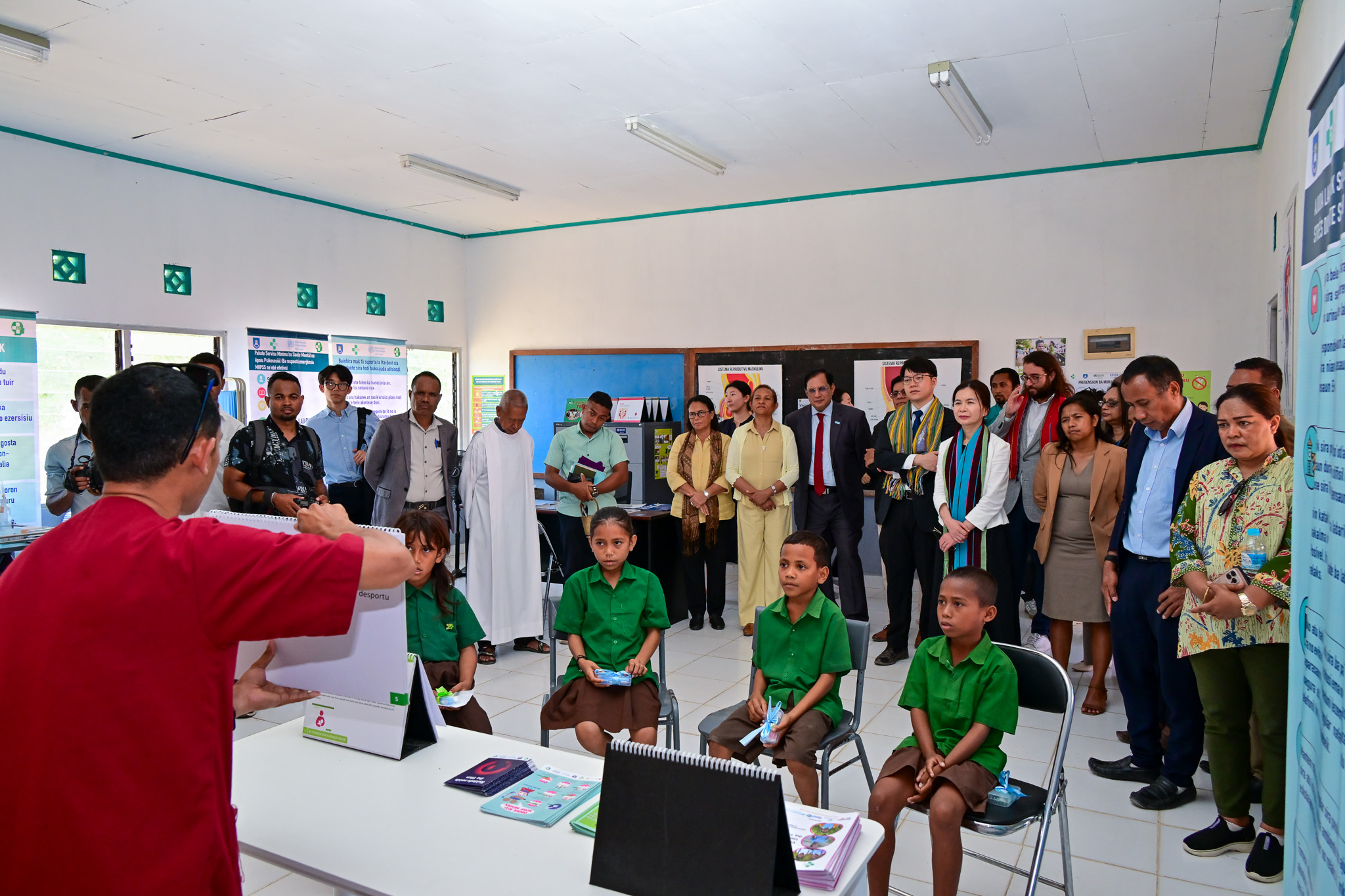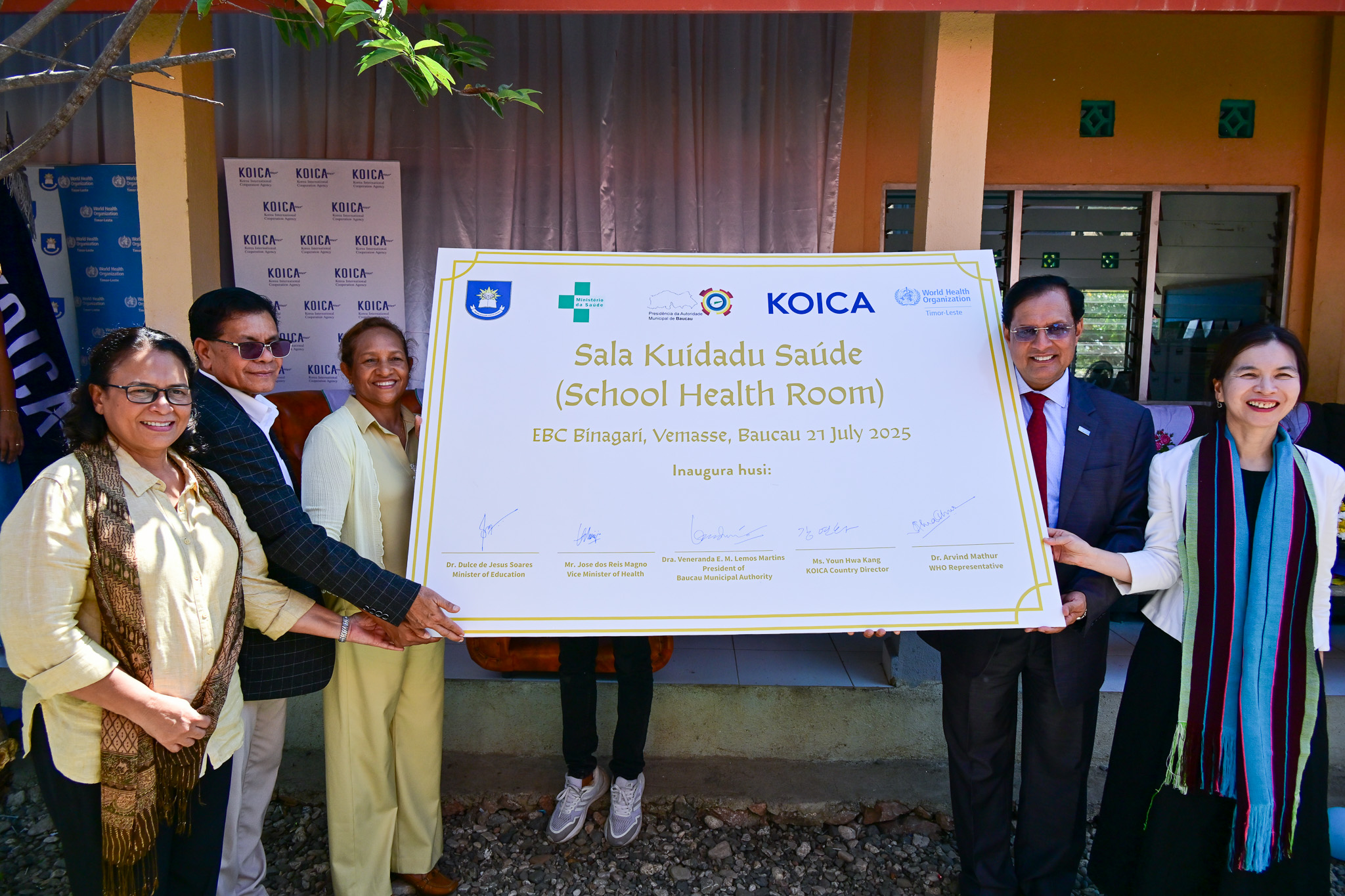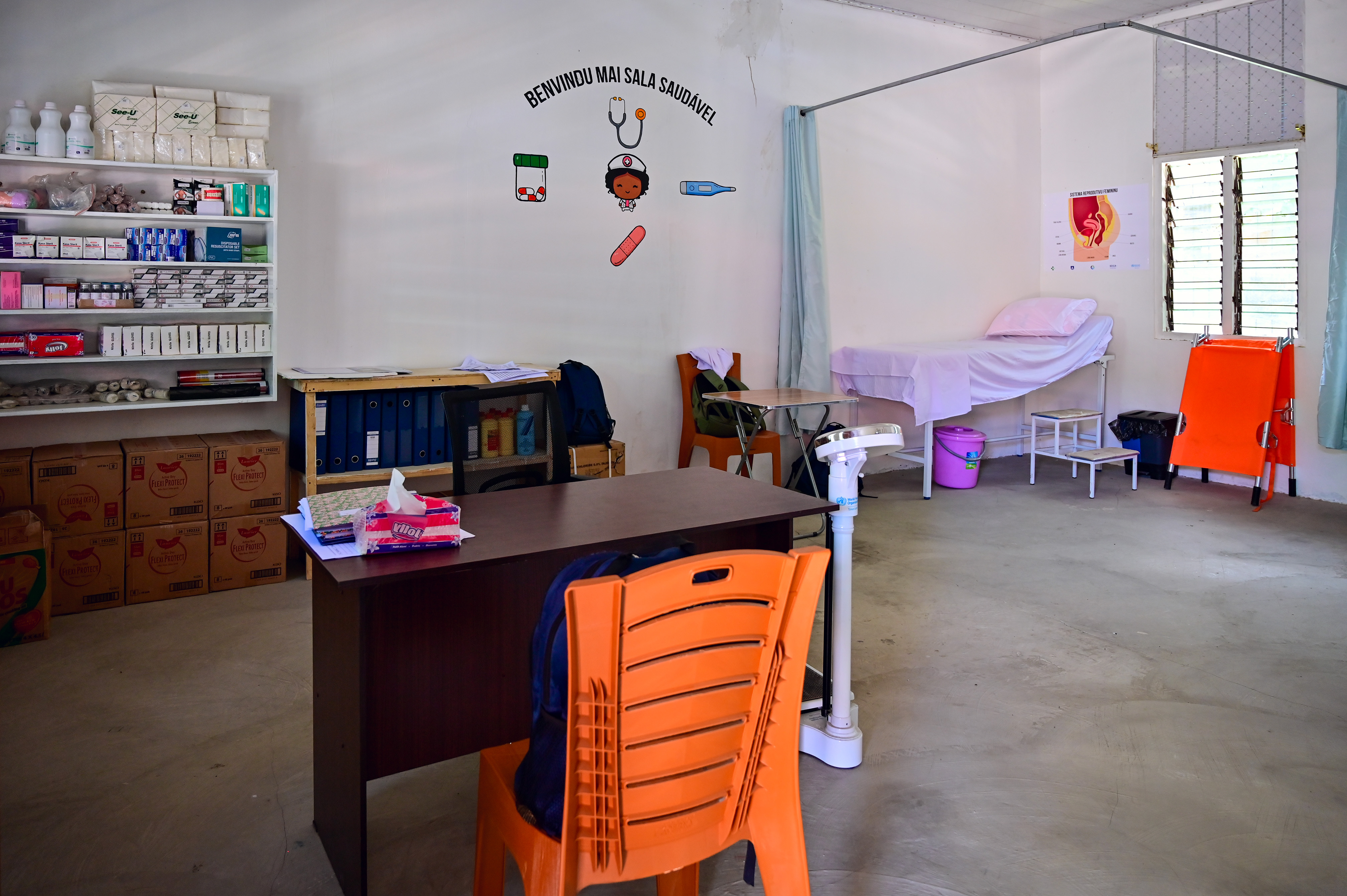Dili, Timor-Leste: At EBC Diligencia, a modest public school in Manufahi, a young boy sat in class, quietly nursing a secret. Days earlier, he had been bitten by a dog at home. But fear of a painful vaccine injection kept him from telling anyone. It was only when a few of his friends noticed the wound and alerted a teacher did action follow. The teacher took the boy to the school’s Sala Saudável (literally, Healthy Room), where the nurse washed his wound and referred him to the nearest Community Health Centre for post-exposure treatment.
 Nurse Octavio Lopes educates students of EBC Binagari School in Baucau about deworming.
Nurse Octavio Lopes educates students of EBC Binagari School in Baucau about deworming.
This small incident illustrates a larger transformation taking place in Timor-Leste: the integration of learning and wellbeing inside the school compound. What began as a single pilot in 2024 has, by June 2025, grown into 11 fully operational Sala Saudávels across four municipalities.
The World Health Organization (WHO), in partnership with the Ministry of Health (MoH) and with support from Korea International Cooperation Agency (KOICA), officially handed over the Sala Saudávels to the Ministry of Education (MoE) at an event in Baucau this July. Beyond the first health and wellness room in Dili, four schools in Manufahi, two in Bobonaro, and four in Baucau have joined the fold.
 MoH, MoE, WHO, and KOICA representatives at the inauguration of the newly established Sala Saudável in Baucau.
MoH, MoE, WHO, and KOICA representatives at the inauguration of the newly established Sala Saudável in Baucau.
At the inauguration of one such room at EBC Binagari School in Baucau, Minister of Education Dulce de Jesus Soares strongly underlined the link between health and learning, stating that “a child’s academic success starts with good health.” She urged schools and communities to keep these rooms truly functional and meaningful- “not in name, but in purpose.”
WHO Representative Dr Arvind Mathur echoed the Education Minister’s message during the handover in Baucau, emphasising that “accessible, on-site health services in schools are critical, especially in rural and remote areas where children often don’t seek help when they need it.”
Sala Saudávels are designed to provide onsite healthcare, making early response and first aid a seamless part of everyday school life. Each school health room is equipped with height and weight scales, basic medical equipment, first aid kits and educational materials. Most importantly, these rooms are staffed by a trained, full-time nurse whom students recognise and trust as part of their daily environment. Beyond physical health, they also provide mental health support through counselling, addressing a growing need among school-aged children. The MOH has complemented these efforts by supplying essential medicines.
 Timor-Leste’s first Sala Saudável was opened in Dili in 2024.
Timor-Leste’s first Sala Saudável was opened in Dili in 2024.
However, the core purpose of the Sala Saudávels goes beyond meeting immediate health needs. “These rooms are designed to serve as holistic care points that foster both physical and mental wellbeing. Alongside first aid and basic medical support, they offer lessons on personal hygiene, nutrition, noncommunicable disease prevention, and awareness of concurrent threats such as rabies,” said Dr Mathur, adding that these efforts aim to shape a generation that grows up valuing healthy habits and carrying forward a culture of wellbeing.
These 11 schools housing the health rooms weren’t selected at random. In 2024, WHO and the ministries of Health and Education conducted assessments in 21 schools across Baucau, Bobonaro, and Manufahi. From that list, 10 were chosen not just for having basic infrastructure like access to water, sanitation, and electricity, but also for the commitment of school leaders to the health–education partnership.
And while still new, the data is already telling a story. Across the 11 rooms, 2,199 student visits have been recorded in 2025 alone. Interestingly, girls accessed the rooms more often than boys, a trend partly attributed to the availability of sanitary pads. Headaches were the commonest complaint among students, followed by physical injury. Fever and skin conditions were also frequently reported.
Crucially, cases requiring escalation received appropriate attention. Of the 2,199 total visits, around 3% (56 cases) required referrals to Community Health Centre (CHC), meaning the remaining 97% were effectively managed on-site. Before taking up their roles, school nurses underwent WHO-led training on managing common childhood health issues, first aid, and school-based health promotion.
 Blessing ceremony for the School Health Room at EBC Binagari School, Baucau.
Blessing ceremony for the School Health Room at EBC Binagari School, Baucau.
“One key lesson was: early care matters. The sooner we act, the better,” said Octavio Soares Lopes, school nurse at EBC Binagari Vemasse, who learned how to work with teachers, manage sick children and respond to accidents during the training. “We were also taught to improve hygiene practices among students,” he said.
Sala Saudávels are part of a broader national initiative under the Say No to 5S (SN5S) programme, led jointly by WHO and the Ministries of Health and Education, with support from KOICA. The SN5S programme has uniquely integrated school-based interventions like deworming and health screening into the education space.
For Ms Youn Hwa Kang, KOICA Country Director, Sala Saudávels represent “spaces of possibility”. “They are designed to nurture both physical and mental resilience in Timor-Leste’s youth,” she said, during the Baucau handover.
While largely encouraging, the data has also started revealing a different challenge.
Despite counselling services being offered, not a single mental health case was recorded across all 11 health rooms. The number likely reflects not the absence of need, but the hesitation to seek help or the lack of awareness among students and staff to identify psychological distress.

Back at EBC Diligencia, what unfolded quietly captured the very essence of the Sala Saudável initiative and the broader vision of the SN5S programme. That simple chain of care—where a classmate observes, a teacher acts, and a nurse responds onsite—reflects exactly what the programme strives to achieve: the seamless integration of health and education across Timor-Leste’s schools.
